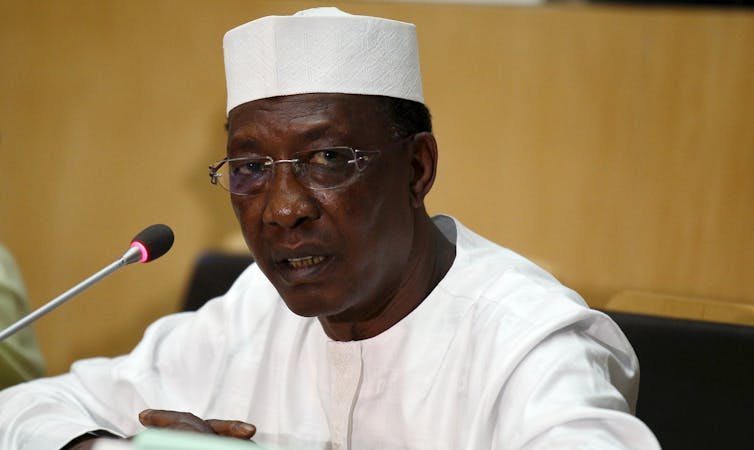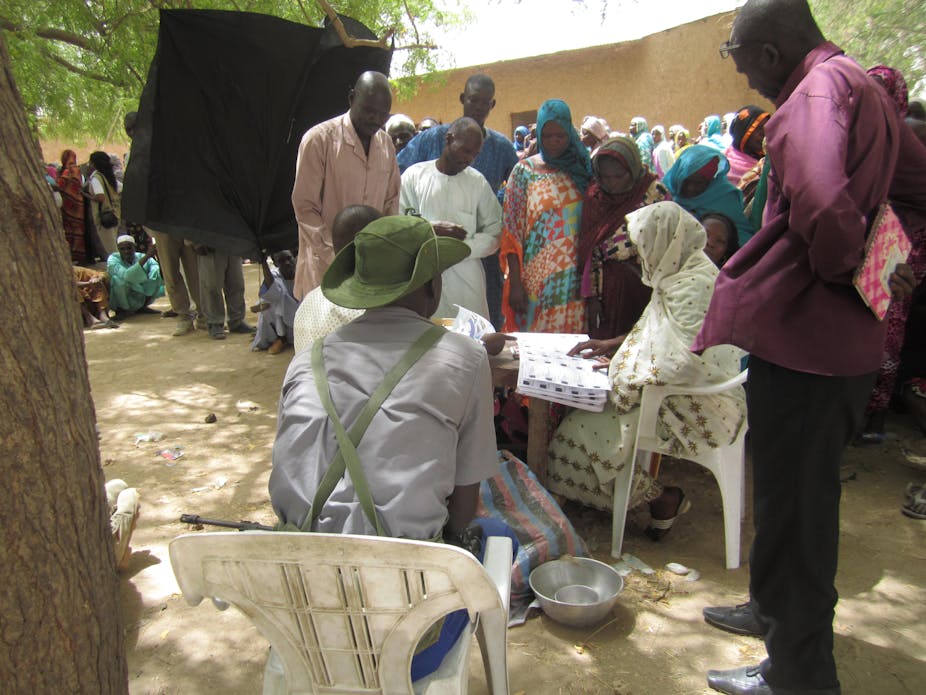The market for biometric identification systems in Africa has been booming since the early 2000s. First developed by multinationals in the defence and security sectors, biometric technology has frequently been proffered as an effective way to avoid disputes over the voters’ roll and to minimise electoral fraud. Applicants for voter registration have their fingerprints recorded and their photographs taken so they can register only once. This technology has become a new standard for voter registration in Africa.
Chad’s first “biometric election”, held over the weekend of April 9 shows, however, that this extremely expensive technology raises hopes but, sadly, does not change the way the political game is played.
The introduction of electoral biometrics had already been put forward in the 2007 agreement between the government and the main opposition coalition, signed under the authority of the European Union. Eight years later, the €22m contract was awarded to French company Morpho, a subsidiary of Safran, after the initial feasibility study was carried out by a French consulting firm. A little over six million voter IDs were produced in France before being sent to Chad.
This technological initiative was not without its share of hold-ups and controversy. Opposition figures lamented the fact that the biometric system was not “comprehensive”. The ID cards, while carefully packed in alphabetical order, were distributed to voters in a chaotic manner and without the use of biometric identification. Distribution appears to have been largely effective, although it remains possible that some cards did not reach their rightful owners.
And while Chadians were asked to submit to fingerprinting at the time of voter registration, come election day they were simply required to sign the roll. The polling booths were not equipped with the technology to verify voter fingerprints.

Biometric voter registration did however lead to a more accurate electoral roll than in previous years, given that each voter was only able to register once. A quick comparison of the 2011 and 2016 electoral rolls reveals a sudden and mysterious population drop in certain regions perceived as presidential strongholds.
A powerful crony network
Technology is no guarantee of fair and transparent elections, even with a “comprehensive” biometric system, from voter registration to the polling booths.
Following a nearly two-week wait, election results finally came on April 22. Unsurprisingly, Idriss Déby, who has presided over his country’s destiny for 26 years, was elected to a fifth term with 61.56% of the votes in the first round.
In contrast to the previous presidential election, held in 2011, which was boycotted by the opposition, 13 candidates (all male) campaigned under tense conditions. During the campaign, community leaders – human rights activists and trade union members who sought to organise demonstrations against President Déby’s candidacy – were arrested and imprisoned. They were finally released after three weeks of demonstrations, including a widespread strike organised by Chad’s Trade Union Confederation, but four were slapped with four-month suspended sentences.
The opposition was up against Déby’s party, the Patriotic Salvation Movement (Mouvement Patriotique du Salut – MPS), a powerful crony network stretching across the entire county. Prior to the election, the streets of N’Djamena were adorned with large posters announcing a “knock-out” victory for Déby, pointing to a defeat for the opposition in the first round of voting. In every neighbourhood, small huts and large estates were turned into Déby “support offices”.
Walls were painted with the MPS’s colors and its logo: a hoe and a Kalashnikov crossed in front of a flame, a reminder that the incumbent candidate came to power through military force, ousting Hissène Habré in 1990.

Repressive measures
While the vote was carried out peacefully, it was beset with problems. Most worrying was the military vote, which took place the day before the civilian election. Officers made sure that the troops voted for the “right” candidate. Soldiers thought to be voting for the opposition disappeared and haven’t been heard from. Their families allege forced disappearances, unconvinced by the security minister’s claims that these soldiers left on deployment, without telling their loved ones.
Voting for the nomad populations was highly disorganised, leaving it wide open to fraud. Some polling stations didn’t provide enough ballots; others lacked material to compile the results. Finally, a texting and social media blackout, which prevented the results from getting out and slowed down possible action, did nothing to assuage rumours.
Distinguishing between logistical problems arising and real cases of fraud is not easy. Especially since the only international observers were from the African Union, an organisation currently headed up by none other than Déby himself. The 30 or so observers deployed across the expansive nation noted some anomalies, but overall decided that the elections were credible and transparent.
Voting was also overseen by national observers from an influential community organisation with close ties to the ruling party, headquartered in one of the capital’s luxury hotels.
Out of sight
The MPS is the only party that was able to send representatives to all polling stations, in contrast to the opposition parties which were not represented across the country. In N’Djamena, the vote took place under the watchful eyes of citizens and activists, as was the case in the southern cities. But in regions where it is costly and sometimes dangerous to be associated with the opposition, or even with “civil society”, this kind of mobilisation was impossible.
How can the voting process and results be overseen without representatives from opposition parties? How can you make sure that ballot boxes are not stuffed overnight or that the voting results sent to the capital are accurate? How can local authorities be prevented from putting pressure on voters? Above all, how can the act of voting have meaning when one party, born of an armed movement, has governed for years by co-opting and repressing its opponents?
The introduction of biometric voter registration has not just been a boon for French industry. Déby now has a mandate that is (somewhat) more credible than before, without having to renounce his old tricks to remain in power.
Translated from the French by Alice Heathwood for Fast for Word.


